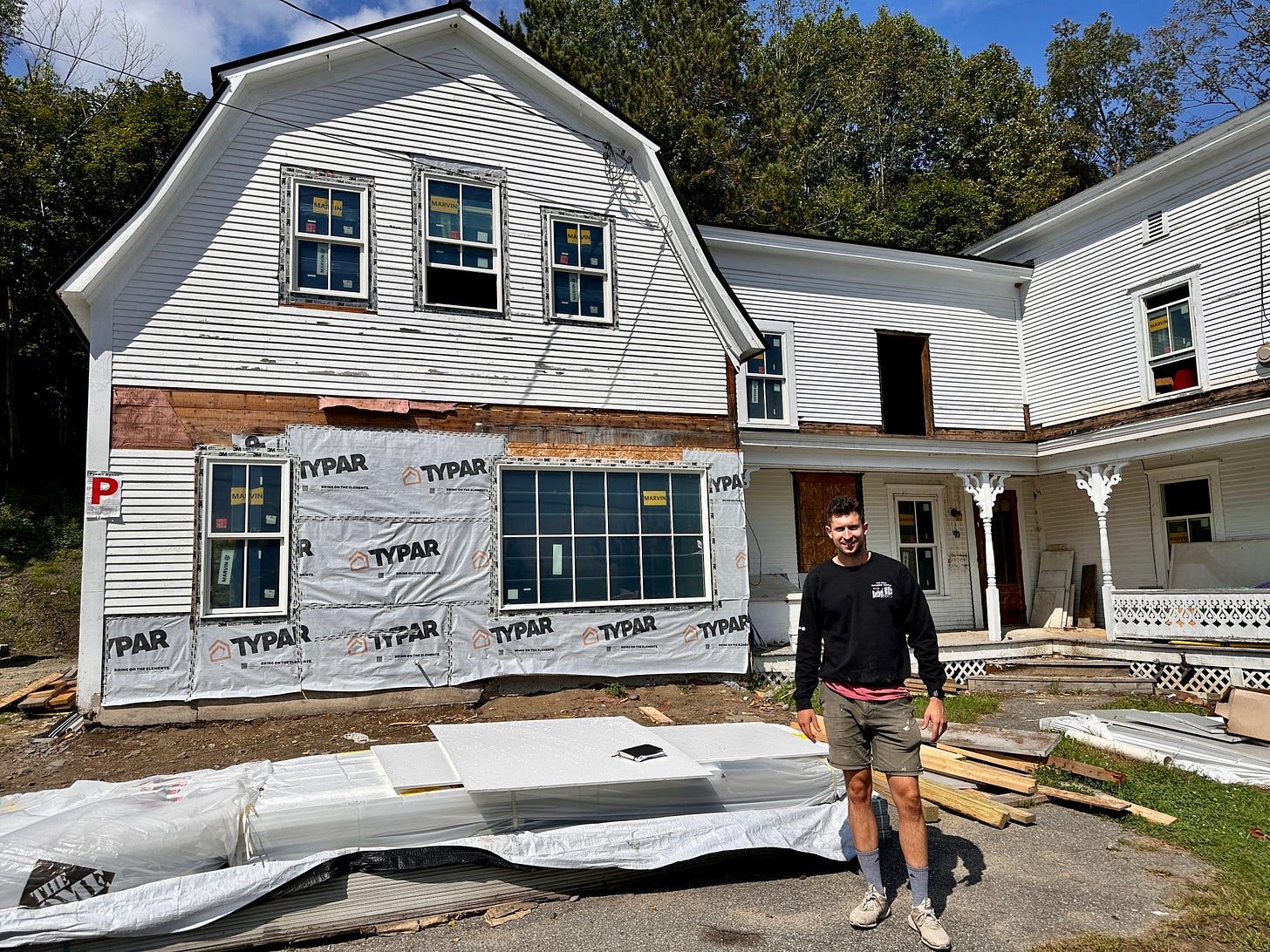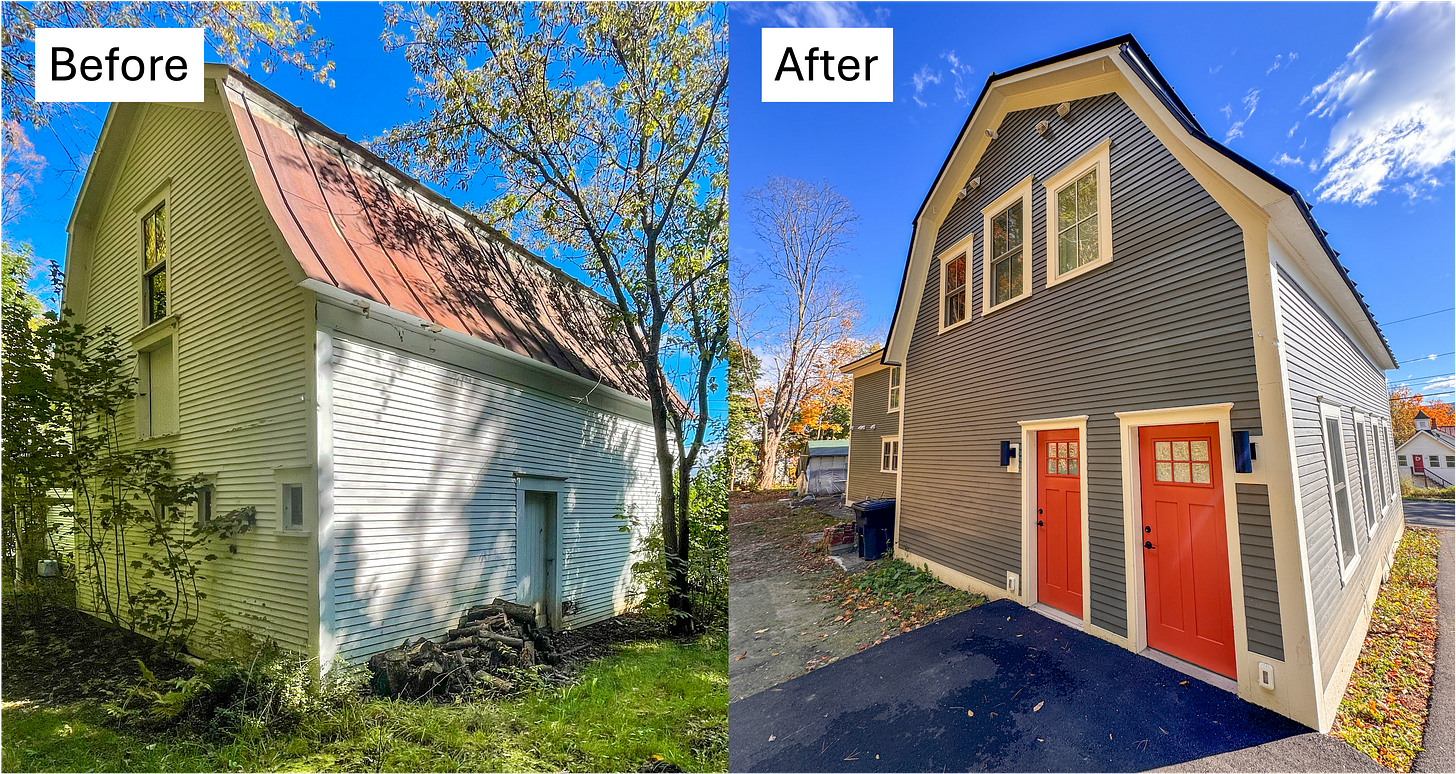The $520,000 Lesson
A cautionary tale for anyone developing affordable housing with grant funding.
Hey — Jonah here.
Welcome back to Brick + Mortar, where I share stories on developing real estate at Village Ventures in rural Vermont.
A few months ago, I shared how I was getting hit with $520,000 in income tax liability for accepting grants to build six units of permanently affordable housing.
Finally—after 10 months—the saga is over.
I paid the bill.
Just in time after receiving a letter from the IRS stating they were going to start slapping liens on my assets.
What. The. Actual. Fuck.
They say no good deed goes unpunished, but I didn’t expect the punishment to come with IRS letterhead and a pink slip.
This is not a fun story to tell. And it will probably cost me some credibility. But whatever. It’s a cautionary tale I wish someone had told me before I went down this road—and one that other small-scale developers need to hear.
Thankfully, I came out of it not bankrupt and somehow even more fired up to keep building. So if this reads a little bleak, don’t worry—I haven’t lost an ounce of optimism.
Where it started
I first got the “hey dude, we might have a problem” email from my accountant in mid-2024.
The project was wrapping up, and I had been operating under the assumption that grants could be treated as a reduction in basis. That’s what I’d seen other developers do.
Sure, that means less depreciation—but it beats taking $1.1m of phantom income in year one.
I didn’t think twice. The grants were awarded in 2022 and, at the time, I didn’t seek tax advice. I didn’t think I needed to.
Big mistake.
Turns out, how grants are taxed—especially in the context of affordable housing—is not something most accountants are equipped to handle. It’s highly specialized, highly nuanced, and highly consequential.
Ignorance is not an excuse, but you have to remember—most of us small-scale developers don’t have $500/hr tax advisors on speed dial. We’re a scrappy bunch that are often under-capitalized, juggling too many roles, and just trying to piece together projects that otherwise wouldn’t get built. That’s the only way to make it work in rural Vermont unless you’re sitting on a trust fund.
Lesson learned.
The IRS didn’t care though. And neither did Vermont’s Department of Taxes for that matter. The code says they’re entitled to that money—and they came to collect.
No easy way out
I spent six months exploring every possible workaround. I talked to funders about restructuring the grants. I tried partnering with a nonprofit. I called state agencies, spoke with 20+ accountants.
Nothing worked.
So I accepted it. I owed half a million dollars.
The project was already maxed out on conventional debt. I couldn’t easily sell—it’s deed-restricted affordable housing. Plus, offloading it would’ve looked like waving a white flag and put me on the affordable housing funding blacklist for future projects. And I certainly didn’t have that kind of money sitting around.
So I did what any self-respecting developer would do: I packed up my bruised ego, crawled over to an affordable housing lender, and sheepishly begged for help.
Thankfully, they listened.
They refinanced the project at better terms and loaned me the money—structured so the property’s limited cash flow could cover the debt service.
Without that, I don’t know where this would’ve ended. I’ll forever be grateful they stepped in.
And then came the appraisal
Adding insult to injury, the building appraised at just $650k. Despite costing $1.3m to develop.
That’s normal for deed-restricted affordable housing, where values are based on rent rolls—ours limited to 50–70% AMI.
Meanwhile, I now had $620k in debt, and I’d spent another $30k just closing the refinance between legal, lender, and CPA fees.
So… two years developing 61 N Pleasant. And now I’m just hoping to break even.
I know I should’ve done more due diligence. But it’s still a tough pill to swallow.
The bigger problem
Up until the 2017 Tax Cuts and Jobs Act, grants like these could be taken as a reduction in basis—no tax owed.
That policy was repealed. No one really knows why.
Now, developers are expected to return 40%+ of the grant funding as income taxes when 100% of those funds are required to be spent on construction costs. It’s absurd.
There’s a perception that grant funding equals free money or padding for developer profits. But let me break it down:
We spent $1.3m to build six units of housing—$220k per unit. Not bad.
The property appraised at $650k. We have $620k in debt. I personally invested $110k yet ended up with $30k in remaining equity.
I’m no Warren Buffet but that’s not a business model. That’s a fluke survival story.
This tax policy doesn’t incentivize affordable housing. It actively undermines it.
The good news
61 N Pleasant is still a win.
It was a phenomenal project and I’m extremely proud of what we were able to deliver.
We turned a rundown house and horse barn into six beautiful apartments a block from downtown. All units leased up instantly. We went over budget, but built something solid that’ll last another 100 years—and still came in under industry-standard cost per unit.
So yeah, I’ll take it on the chin and move forward.
And if you’re a developer working with grant funding, remember—eyes wide open!
Until next time.
— Jonah 🧱
P.S. Want to connect? Find me on LinkedIn.






Aside from the fact that you are an excellent writer and story teller (and champion of small town Vermont), your story has made me feel SO much better about my own recent pill of an IRS bill that I had to swallow for a mistake I made. I commend you for not concluding ‘F it to the whole thing’ and taking it as learned experience and moving forward with your good work.
Hang in there Jonah !!!! The whole system/world is upside down & inside-out. Glad you were able to push through it.